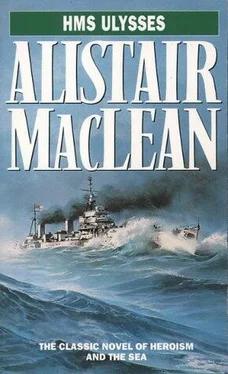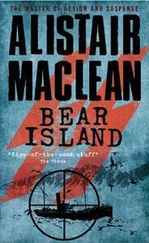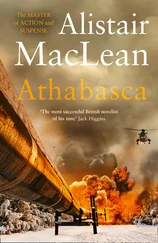Alistair MacLean - HMS Ulysses
Здесь есть возможность читать онлайн «Alistair MacLean - HMS Ulysses» — ознакомительный отрывок электронной книги совершенно бесплатно, а после прочтения отрывка купить полную версию. В некоторых случаях можно слушать аудио, скачать через торрент в формате fb2 и присутствует краткое содержание. Жанр: prose_military, на английском языке. Описание произведения, (предисловие) а так же отзывы посетителей доступны на портале библиотеки ЛибКат.
- Название:HMS Ulysses
- Автор:
- Жанр:
- Год:неизвестен
- ISBN:нет данных
- Рейтинг книги:3 / 5. Голосов: 1
-
Избранное:Добавить в избранное
- Отзывы:
-
Ваша оценка:
- 60
- 1
- 2
- 3
- 4
- 5
HMS Ulysses: краткое содержание, описание и аннотация
Предлагаем к чтению аннотацию, описание, краткое содержание или предисловие (зависит от того, что написал сам автор книги «HMS Ulysses»). Если вы не нашли необходимую информацию о книге — напишите в комментариях, мы постараемся отыскать её.
HMS Ulysses — читать онлайн ознакомительный отрывок
Ниже представлен текст книги, разбитый по страницам. Система сохранения места последней прочитанной страницы, позволяет с удобством читать онлайн бесплатно книгу «HMS Ulysses», без необходимости каждый раз заново искать на чём Вы остановились. Поставьте закладку, и сможете в любой момент перейти на страницу, на которой закончили чтение.
Интервал:
Закладка:
The Aldis on the Sirrus had begun to flash. Bentley read the message, turned to Vallery.
"Commander Orr requests permission to go alongside, port side, take off survivors."
"Port, is it?" Turner nodded. "The sub's blind side. It's a fair chance, sir, in a calm sea. As it is..." He looked over at the Sirrus, rolling heavily in the beam sea, and shrugged. "Won't do her paintwork any good."
"Her cargo?" Vallery asked. "Any idea? Explosives?" He looked round, saw the mute headshakes, turned to Bentley.
"Ask Electro if she's carrying any explosives as cargo."
Bentley's Aldis chattered, fell silent. After half a minute, it was clear that there was going to be no reply.
"Power gone, perhaps, or his Aldis smashed," the Kapok Kid ventured.
"How about one flag for explosives, two for none?"
Vallery nodded in satisfaction. "You heard, Bentley?"
He looked over the starboard quarter as the message went out. The Vectra was almost a mile distant rolling, one minute, pitching the next as she came round in a tight circle. She had found the killer, and her depth-charge racks were empty.
Vallery swung back, looked across to the Electro. Still no reply, nothing... Then he saw two flags fluttering up to the yardarm.
"Signal the Sirrus," he ordered. "'Go ahead: exercise extreme care.'"
Suddenly, he felt Turner's hand on his arm.
"Can you hear 'em?" Turner asked.
"Hear what?" Vallery demanded.
"Lord only knows. It's the Vectra. Look!"
Vallery followed the pointing finger. At first, he could see nothing, then all at once he saw little geysers of water leaping up in the Vectra's wake, geysers swiftly extinguished by the heavy seas. Then, faintly, his straining ear caught the faraway murmur of underwater explosions, all but inaudible against the wind.
"What the devil's the Vectra doing?" Vallery demanded. "And what's she using?"
"Looks like fireworks to me," Turner grunted. "What do you think, Number One?"
"Scuttling charges-25-pounders," Carrington said briefly.
"He's right, sir," Turner admitted. "Of course that's what they are.
Mind you, he might as well be using fireworks," he added disparagingly.
But the Commander was wrong. A scuttling charge has less than a tenth part of the disruptive power of a depth-charge, but one lodged snugly in the conning-tower or exploding alongside a steering plane could be almost as lethal. Turner had hardly finished speaking when a U-boat, the first the Ulysses had seen above water for almost six months-porpoised high above the surface of the sea, hung there for two or three seconds, then crashed down on even keel, wallowing wickedly in the troughs between the waves.
The dramatic abruptness of her appearance, one moment the empty sea, the next a U-boat rolling in full view of the entire convoy, took every ship by surprise, including the Vectra. She was caught on the wrong foot, moving away on the outer leg of a figure-of-eight turn. Her pom-pom opened up immediately, but the pom-pom, a notoriously inaccurate gun in the best of circumstances, is a hopeless proposition on the rolling, heeling deck of a destroyer making a fast turn in heavy weather: the Oerlikons registered a couple of hits on the conning-tower, twin Lewises peppered the hull with as much effect as a horde of angry hornets; but by the time the Vectra was round, her main armament coming to bear, the U-boat had disappeared slowly under the surface.
In spite of this, the Vectra's 4.7s opened up, firing into the sea where the U-boat had submerged, but stopping almost immediately when two shells in succession had ricocheted off the water and whistled dangerously through the convoy. She steadied on course, raced over the position of the submerged U-boat: watchers on the Ulysses, binoculars to their Vectra's poop-deck hurling more scuttling charges over the eyes, could just distinguish duffel-coated figures on the side. Almost at once, the Vectra's helm went hard over and she clawed her way back south again, guns at maximum depression pointing down over her starboard side.
The U-boat must have been damaged, more severely this time, by either the shells or the last charges. Again she surfaced, even more violently than before, in a seething welter of foam, and again the Vectra was caught on the wrong foot, for the submarine had surfaced off her port bow, three cable-lengths away.
And this time, the U-boat was up to stay. Whatever Captain and crew lacked, it wasn't courage. The hatch was open, and men were swarming over the side of the conning-tower to man the gun, in a token gesture of defiance against crushing odds.
The first two men over the side never reached the gun, breaking, sweeping waves, waves that towered high above the submarine's deck, washed them over the side and they were gone. But others flung themselves forward to take their place, frantically training their gun through a 90ø arc to bear on the onrushing bows of the Vectra.
Incredibly, for the seas were washing over the decks, seas which kept tearing the men from their posts, and the submarine was rolling with impossible speed and violence-their first shell, fired over open sights, smashed squarely into the bridge of the Vectra. The first shell and the last shell, for the crew suddenly crumpled and died, sinkiag down by the gua or pitching convulsively over the side.
It was a massacre. The Vectra had two Boltoa-Paul Defiant night-fighter turrets, quadruple hydraulic turrets complete with astrodome, bolted to her fo'c'sle, and these had opened up simultaneously, firing, between them, something like a fantastic total of 300 shells every ten seconds. That often misused cliche "hail of lead" was completely accurate here. It was impossible for a man to live two seconds on the exposed deck of that U-boat, to hope to escape that lethal storm. Man after man kept flinging himself over the coaming in suicidal gallantry, but none reached the gun.
Afterwards, no one aboard the Ulysses could say when they first realised that the Vectra, pitching steeply through the heavy seas, was going to ram the U-boat. Perhaps her Captain had never intended to do so. Perhaps he had expected the U-boat to submerge, had intended to carry away conning-tower and periscope standard, to make sure that she could not escape again. Perhaps he had been killed when that shell had struck the bridge. Or perhaps he had changed his mind at the last second, for the Vectra, which had been arrowing in on the conning-tower, suddenly slewed sharply to starboard.
For an instant, it seemed that she might just clear the U-boat's bows, but the hope died the second it was born. Plunging heavily down the sheering side of a gaping trough, the Vectra's forefoot smashed down and through the hull of the submarine, some thirty feet aft of the bows, slicing through the toughened steel of the pressure hull as if it were cardboard. She was still plunging, still driving down, when two shattering explosions, so close together as to be blurred into one giant blast, completely buried both vessels under a sky-rocketing mushroom of boiling water and twisted steel. The why of the explosion was pure conjecture; but what had happened was plain enough. Some freak of chance must have triggered off the T.N.T.-normally an extremely stable and inert disruptive, in a warhead in one of the U-boat's tubes: and then the torpedoes in the storage racks behind and possibly, probably even, the for'ard magazine of the Vectra had gone up in sympathetic detonation.
Slowly, deliberately almost, the great clouds of water fell back into the sea, and the Vectra and the U-boat-or what little was left of them-came abruptly into view. To the watchers on the Ulysses, it was inconceivable that either of them should still be afloat. The U-boat was very deep in the water, seemed to end abruptly just for'ards of the gun platform: the Vectra looked as if some great knife had sheared her athwartships, just for'ard of the bridge. The rest was gone, utterly gone. And throughout the convoy unbelieving minds were still wildly rejecting the evidence of their eyes when the shattered hull of the Vectra lurched into the same trough as the U-boat, rolled heavily, wearily, over on top of her, bridge and mast cradling the conning-tower of the submarine. And then the water closed over them and they were gone, locked together to the bottom of the sea.
Читать дальшеИнтервал:
Закладка:
Похожие книги на «HMS Ulysses»
Представляем Вашему вниманию похожие книги на «HMS Ulysses» списком для выбора. Мы отобрали схожую по названию и смыслу литературу в надежде предоставить читателям больше вариантов отыскать новые, интересные, ещё непрочитанные произведения.
Обсуждение, отзывы о книге «HMS Ulysses» и просто собственные мнения читателей. Оставьте ваши комментарии, напишите, что Вы думаете о произведении, его смысле или главных героях. Укажите что конкретно понравилось, а что нет, и почему Вы так считаете.












